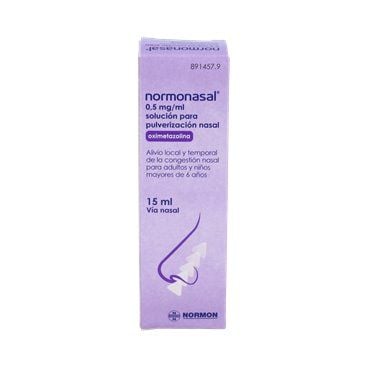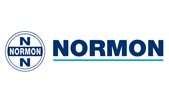Normonasal 0.5 Mg/Ml Nasal Nebuliser 15 Ml
This medicine belongs to the group of medicines called Sympathomimetics. It is a nasal decongestant medicine that contains oxymetazoline as an active ingredient. Oxymetazoline administered through the nose, produces constriction of blood vessels locally, decongesting the nasal mucosa.
This medicine belongs to the group of medicines called Sympathomimetics. It is a nasal decongestant medicine that contains oxymetazoline as an active ingredient. Oxymetazoline administered through the nose, produces constriction of blood vessels locally, decongesting the nasal mucosa.
Normonasal (0.5 Mg / Ml Nasal Spray Solution 1 Bottle 15 Ml)
Oxymetazoline, hydrochloride
ACTION AND MECHANISM
- Nasal decongestant. Oxymetazoline is an imidazole derivative of clonidine with alpha agonist activity. Its pharmacology is not perfectly established, but its topical vasoconstrictive effects appear to be due to binding to postsynaptic alpha-2 receptors, although certain alpha-1 effects cannot be ruled out. After its topical administration, it causes a vasoconstriction of the capillaries of the mucosa, reducing the blood content and the swelling of the mucosa, which produces a decongestant effect on the nasal passages.
The decongestant effects of oxymetazoline are longer lasting than those of alpha-1 agonists, such as phenylephrine, although slower.
PHARMACOKINETICS
- Absorption: Not many pharmacokinetic studies have been performed with oxymetazoline. It has been found that this drug could be absorbed after nasal administration. The decongestant effects appear after 5-10 minutes, being maximum after 6 hours. Its vasoconstrictor activity can last up to 12 hours.
- Elimination: Oxymetazoline is eliminated in the urine, with 30% of the dose appearing unchanged after 72 hours. It also presents some elimination by faeces (10%). Its elimination half-life is 5-8 hours.
INDICATIONS
- Symptomatic treatment of local and temporary [NASAL CONGESTION], as in the case of [COMMON COLD] and [RHINITIS].
POSOLOGY
- Adults and children from 6 years old:
Make 2 or 3 applications in each nostril, maximum 2 times a day (in the morning and at night).
- Children under 6 years of age: The safety and efficacy of this medicine have not been evaluated. It is not recommended.
RULES FOR CORRECT ADMINISTRATION
It is recommended to administer this medicine in the morning and at night, avoiding treatments of more than 3 days in a row to avoid the appearance of rebound congestion, which is usually translated by the patient as an absence of effects, which entails a new administration, with the risk of overdose.
Before each administration, the nasal passages must be cleaned.
The valve of the container will be introduced into the nostrils, in a vertical position. Actuate the valve, simultaneously taking a deep breath to facilitate maximum drug penetration. Each press must be brief, that is, the time required to press fully and then release.
Once the medicine has been administered, the end of the valve will be cleaned with hot water, then dried with a clean cloth.
Nasal spray: If this product is being used for the first time or it has not been used for a long time, it is necessary to charge the spray. To do this, keeping the container away from the body, the sprayer is pressed down several times until a finely pulverized liquid comes out.
CONTRAINDICATIONS
- Hypersensitivity to any component of the drug.
PRECAUTIONS
- Patients in whom sympathetic stimulation could worsen their pathologies. Nasally administered oxymetazoline does not theoretically present a risk for these patients, although systemic absorption cannot be ruled out. Even in the case of such absorption, the effects on presynaptic alpha-2 receptors would theoretically predominate, with the consequent sympatholytic effects. However, it cannot be ruled out that this drug also has affinity for other adrenergic receptors, both alpha-1 and beta receptors, so most authors recommend taking extreme precautions in case of pathologies such as [DIABETES], [ GLAUCOMA], [CORONARY INSUFFICIENCY], [ISCHEMIC CARDIOPATIA], [CARDIAC ARRHYTHMIA], [ARTERIAL HYPERTENSION], [HYPERTHYROIDISM], [FEOCROMOCYTOMA] or [PROSTATIC HYPERPLASIA].
- Rebound congestion. The administration of topical vasoconstrictors often leads to rebound congestion, which is usually accompanied by redosing by the patient. This can pose a risk of overdose, as well as a potentiation of congestion. It is recommended to gradually suspend the administration of oxymetazoline in case of rebound congestion, alternating the doses in each nostril, until definitive withdrawal.
PRECAUTIONS RELATING TO EXCIPIENTS
- Because it contains benzalkonium chloride, it can cause inflammation of the nasal mucosa, especially in long-term treatments. If persistent nasal congestion is suspected, a nasal product that does not contain this preservative should be used whenever possible.
ADVICE TO THE PATIENT
- The nose should be cleaned before each application.
- Proper nasal and applicator hygiene is advisable.
- It is recommended not to exceed the recommended daily doses or use for more than three days in a row to avoid rebound congestion.
- Treatment should be stopped and seek medical advice if symptoms persist, worsen or if high fever, dizziness, insomnia or nervousness appear.
- It is common to have an itchy sensation or nasal discomfort after application, which disappears after several doses.
INTERACTIONS
No drug interactions have been described with oxymetazoline administered nasally, although this drug could be absorbed through the nasal mucosa or by ingestion of the product. There is some controversy about the effects of alpha-2 vasoconstrictors, since at the systemic level the affinity for presynaptic receptors would predominate, with sympatholytic effects appearing. Despite this, and due to the possibility that this drug also acts on other adrenergic receptors, prudence advises extreme precautions when administered together with drugs such as MAOI-type antidepressants or tricyclic antidepressants, with antihypertensives such as diuretics, beta-blockers, methyl-dopa or guanethidine, with thyroid hormones, with nerve stimulants, nitrates or with digoxin.
PREGNANCY
Animal studies have not been performed, although other sympathomimetic amines have resulted in teratogenic effects in some species. There are no adequate and well-controlled studies in humans, so it is unknown whether nasal application of oxymetazoline could lead to adverse effects, although possible systemic absorption should be taken into account. The use of this medicine is only accepted in the absence of safer therapeutic alternatives, and limiting its use to short periods of time.
LACTATION
It is unknown whether oxymetazoline is excreted in human milk, and its possible effects on newborns. Taking into account that systemic absorption is possible, and since young children are especially sensitive to the adverse effects of sympathomimetic amines, it is recommended to stop breastfeeding or avoid the administration of this medicine.
KIDS
Safety and efficacy have not been evaluated in children under 6 years of age, so its use is not recommended. In children, the appearance of adverse reactions such as sedation is more common, which can become serious and require supportive treatment.
SENIORS
Elderly patients are more susceptible to adverse reactions after the use of sympathomimetics. They can also suffer from pathologies that could be worsened by the administration of sympathomimetics, as well as being treated with drugs with which this active principle could interact. It is recommended to closely monitor patients over 60 years of age, and discontinue treatment at the slightest indication of significant adverse reactions. Dosage readjustment may be necessary.
EFFECTS ON DRIVING
Oxymetazoline can lead to sedation, substantially affecting the ability to drive and / or operate machinery. Patients should avoid operating dangerous machinery, including automobiles, until they are reasonably certain that drug treatment does not adversely affect them.
ADVERSE REACTIONS
The adverse effects of this medicine are usually local and mild. However, a systemic absorption of this drug cannot be ruled out, with the appearance of systemic adverse effects, which may increase in intensity and severity at higher doses. The most frequent alterations are:
- Local effects: It is common the appearance of [SNEEZING], [NASAL IRRITATION], local itching and burning sensation, [NASAL DRYNESS] or [RINORRHEA]. Rebound [NASAL CONGESTION] is also common, especially with high doses or after prolonged periods of time. In case of drug abuse, [RHINITIS] may appear, the mucosa appearing edematous and with a reddish or pale gray color. These signs usually disappear after a week of stopping the drug.
- Systemic effects: Oxymetazoline absorption can lead to [DIZZINESS], [DASH], [NAUSEA], [VOMITING], [NERVIOSISM], [PALPITATIONS], [ARTERIAL HYPERTENSION], [BRADICARDIA] reflex, [HYPERHIDROSIS] or [PALE]. In children it may cause [Drowsiness].
ADVERSE REACTIONS RELATING TO EXCIPIENTS
- Because it contains benzalkonium chloride, it can give rise to [RHINITIS].
OVERDOSE
Symptoms: There is not much experience on dosages with oxymetazoline, since due to the form of administration, acute overdosage is not usually frequent. In case of accidental ingestion of other drugs such as naphazoline, the appearance of nervous depression, with sedation, intense hypothermia, bradycardia and in severe situations, coma is common. This overdose is especially important in children. Headache, tremor, palpitations, nervousness, or excessive sweating may also appear. The LD50 is 10 mg in children 2 years of age, and about 100 mg in adults.
Treatment: After ingestion, it is recommended to remove the drug by gastric lavage and administration of activated charcoal every 4-6 hours. In early stages, emetics and saline laxatives can be given. However, these measures do not appear to be very effective, as sedation appears quickly.
The treatment must be symptomatic and supportive. In case of seizures, diazepam will be administered. Administration of vasopressors should be avoided if the patient is hypotensive. It is recommended to monitor cardiac function and vital signs.
Ruben S. published the 16/07/2024 following an order made on 04/07/2024
El producto es de gran calidad.




